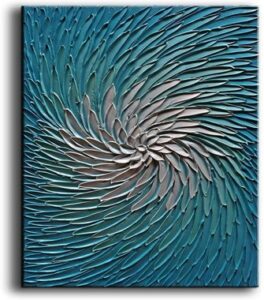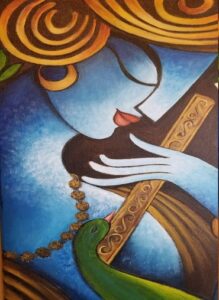Modern art refers to the wide range of art styles that emerged in the late 19th century and flourished throughout the 20th century. It encompasses a vast array of artistic movements, styles, and techniques, ranging from Impressionism, Cubism, Surrealism, Abstract Expressionism, and Pop Art, among others.

One of the defining characteristics of modern art is its departure from traditional representational art. Unlike the realistic and naturalistic styles of the past, modern art is characterized by its emphasis on subjective interpretation and personal expression, often challenging the boundaries of what was previously considered acceptable or beautiful.
In terms of techniques, modern art utilizes a wide range of mediums, from paint, sculpture, and printmaking to photography, video, and digital art. The use of non-traditional materials, such as found objects, industrial materials, and everyday items, is also common in modern art.
Modern art also reflects the social and cultural changes of the 20th century, particularly in the wake of World War I and World War II. Many modern artists sought to challenge conventional values and societal norms, creating works that were provocative, politically charged, or even controversial.
Some of the most prominent artists of modern art include Pablo Picasso, Wassily Kandinsky, Henri Matisse, Salvador Dali, Frida Kahlo, Jackson Pollock, Andy Warhol, and Jeff Koons, among many others. Their works are characterized by their innovative techniques, bold use of color and form, and their exploration of new artistic concepts and ideas.
Overall, modern art is a diverse and dynamic field that continues to evolve and push the boundaries of artistic expression. Its impact can be seen in various aspects of contemporary culture, from advertising and design to film and fashion, making it a vital part of our cultural heritage.
Modern art is a diverse and complex movement that encompasses a wide range of styles, techniques, and mediums. It emerged as a response to the rapid social, political, and technological changes of the late 19th and early 20th centuries, and it sought to challenge traditional artistic conventions and push the boundaries of artistic expression.
Throughout its history, modern art has faced criticism and controversy, with some questioning its validity and others embracing its innovation and creativity. Nevertheless, it has had a profound impact on the art world and has influenced countless artists and artistic movements since its inception.
Today, modern art continues to evolve and inspire, with artists exploring new forms of expression and experimentation. It remains a vital and vibrant force in the art world, pushing boundaries and challenging our perceptions of what art can be.

Penkraft conducts classes, course, online courses, live courses, workshops, teachers’ training & online teachers’ training in Handwriting Improvement, Calligraphy, Abacus Maths, Vedic Maths, Phonics and various Craft & Artforms – Madhubani, Mandala, Warli, Gond, Lippan Art, Kalighat, Kalamkari, Pichwai, Cheriyal, Kerala Mural, Pattachitra, Tanjore Painting, One Stroke Painting, Decoupage, Image Transfer, Resin Art, Fluid Art, Alcohol Ink Art, Pop Art, Knife Painting, Scandinavian Art, Water Colors, Coffee Painting, Pencil Shading, Resin Art Advanced etc. at pan-India locations. With our mission to inspire, educate, empower & uplift people through our endeavours, we have trained & operationally supported (and continue to support) 1500+ home-makers to become Penkraft Certified Teachers? in various disciplines.
